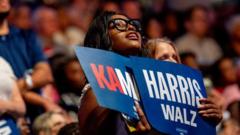On the vibrant campus of the University of Michigan, young women are turning the tide for the upcoming presidential election, enthusiastically participating in early voting initiatives. This surge of support is particularly vital for Vice President Kamala Harris, who is banking on female voters to tip the scale in her favor. On a warm fall morning, students lined up at the university’s early voting center, among them Keely Ganong, a junior eager to cast her vote for Harris. “She’s a leader that I aspire to have represent my country,” Ganong stated.
Conversations among students reflect a brewing sense of urgency to engage in the electoral process. Lola Nordlinger, a fellow student, highlighted that “gender equality is at the forefront of the issues," signaling the importance of abortion rights. Polls show Harris leading the young female demographic significantly, with a recent Harvard study indicating she is favored by a staggering 30 points among women aged 18-29. Furthermore, a separate survey reveals a 38-point advantage among college students.
In addition to campus efforts, young women are mobilizing at rallies. Hannah Brocks, 20, expressed her admiration for Harris’s compassionate messaging while actively campaigning for her. The current electoral climate mirrors 2020, which saw a remarkable increase in female voter turnout; early voting trends suggest that women once again represent a substantial majority.
Yet, the path forward is intricate. While Harris rallies progressive female voters, political analysts remain cautious about her standing among white, non-college educated women, a demographic that has historically leaned towards Republican candidates. Some, like 53-year-old Rebecca Gau, a former Republican who switched her allegiance to Biden in 2020, are now motivated to support Harris, citing a desire for representative leadership that rejects “toxic masculinity.”
However, dissent exists within Republican ranks as well. Voter panelist Tracey Sorrel expressed her hesitation about Harris's policies on abortion, illustrating the complexities of voter sentiment. As debates surrounding reproductive rights intensify, women are sharing personal stories to galvanize fellow voters. "For us, this election couldn’t be more important," remarked Mary Jelkovsky, a 26-year-old from Arizona, who emphasized the personal impact of abortion rights following the Supreme Court's decision to overturn Roe v. Wade.
Harris’s campaign aims to not only boost Democratic turnout but also sway undecided Republican women. The electoral stakes are high, and as young women assert their voices, their influence could prove critical in determining the outcome of this year's election.





















